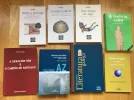Rainerbernd
Active Member
- Time of past OR future Camino
- On St James ways since 1971
Olá,
You are on your way and follow a call of nature, you may encounter something very strange. Off path you can find a small "altar" with candles, a bottle with some liquid, cigarettes and a cross or a doll. Maybe this never happens to you, but if, here is the answer:
People make a macumba on there. It has little to do with christianity. Mostly they make macumba to varios gods or saints for getting a love, money, health and so on. Some practioners purport to use it to inflict harm, illness etc. on other people for various reasons.
Portugal and Galicia are catholic countries. But in newspapers you will find so many adverts by witches, sorcerers and fortune tellers.
Bom caminho, Rainer
.
You are on your way and follow a call of nature, you may encounter something very strange. Off path you can find a small "altar" with candles, a bottle with some liquid, cigarettes and a cross or a doll. Maybe this never happens to you, but if, here is the answer:
People make a macumba on there. It has little to do with christianity. Mostly they make macumba to varios gods or saints for getting a love, money, health and so on. Some practioners purport to use it to inflict harm, illness etc. on other people for various reasons.
Portugal and Galicia are catholic countries. But in newspapers you will find so many adverts by witches, sorcerers and fortune tellers.
Bom caminho, Rainer
.

















